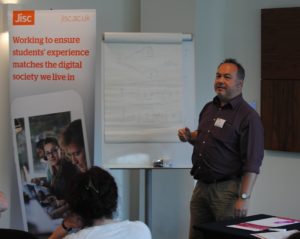Let’s meet………..Neil Jefferies
Neil Jefferies is Head of Innovation for the Open Scholarship Support team at the Bodleian Libraries, Oxford University. Starting back in May 2014, he project-managed Oxford’s participation (along with seven other institutions) in the Jisc-ARMA ORCID Pilot that was a precursor to the establishment of the UK ORCID Consortium in August 2015. In June 2016, he published an ORCID Scoping Study Report that examined adoption at a number of institutions with a view to recommending areas for strategic investment and policy intervention. Since then he has served on the UK ORCID Community Forum advising and assisting the Consortium with its activities.


In what may (or may not) become the first of a series in which we meet members of our community, we asked Neil to reflect on 5 years of the UK ORCID consortium. Neil writes:
When Oxford implemented ORCID IDs they made the strategic choice to integrate them with our central university identity management system. While this was a more difficult route than integrating with our institutional repository, it was felt that, in the longer term, more systems would start to support ORCID IDs and having them available centrally would simplify life. It is fair to say that this has happened, but rather more slowly than originally anticipated, so that significant benefits have only been seen recently. On the other hand, empirically, having visibility of ORCID when new joiners to the university sign up for other IT-related services has almost certainly resulted in greater awareness and uptake.
Looking back over the past five years or so, the UK ORCID Consortium has grown significantly both in terms of membership and the range of supporting services that it provides to its members. Toolkits for advocacy and training remain popular since ORCID is still not yet ubiquitous in the scholarly landscape. Particularly in the Arts and Humanities, where scholarly communication is less oriented towards journal articles and a significant proportion of activity is not funder-driven, the benefits of ORCID are harder to articulate.
The current scholarly communications environment, shifting in emphasis away from just peer reviewed articles to a much broader set of (mostly open) research outputs presents both a challenge and an opportunity. While these new channels mean that ORCID faces a more complex set of integration requirements, new entrants into the market are also less encumbered with legacy technology and processes, and thus have the agility to adopt ORCID with relative ease.
At the same time, the emergence of broader concepts of scholarly impact that take this diversity of outcomes into account, requires new metrics beyond publication counts, impact factors and citations. ORCID IDs and article DOIs are thus being joined by a growing number of other persistent identifiers for data, software, organisations and facilities to enable outputs to be attributed and credited reliably and unambiguously. In the longer term, this work holds the promise of more automatic, and better, metadata management which will simplify curation workflows and improve discovery and reuse. However, much work remains to be done, and ultimately all this effort remains centered on research and the researcher.
